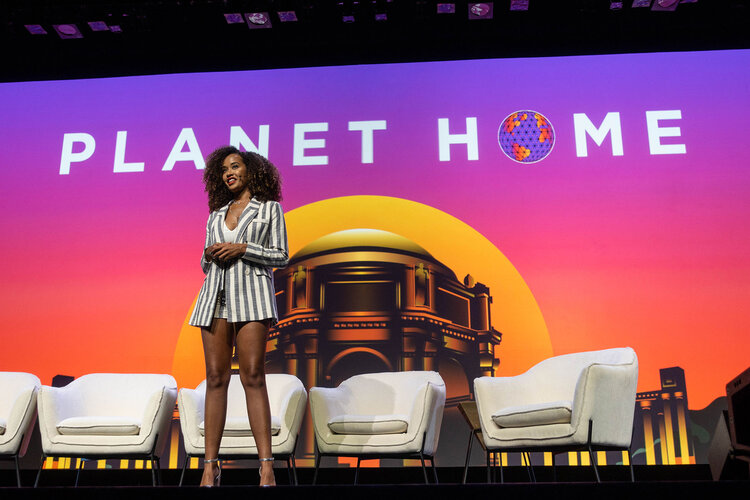Ripple Effect – Danni Washington

Danni Washington is breaking barriers for women and people of color while saving the ocean
Danni Washington was surrounded by sharks.
“It was breathtaking, scary, and exhilarating all at the same time,” she says.
The encounter happened while Washington was filming an episode of the Discovery Channel’s “Shark Week” series in Brazil. “We were just exploring, and then we were in the water with about 18 lemon sharks around us.” Lemon sharks aren’t typically aggressive toward humans—but the experience got Washington’s adrenaline pumping.
“You have to keep your head on a swivel when you’re in the water with predators,” says the adventure-loving TV personality. “But being able to look a shark in the eye underwater will change your life.”
Growing up in Miami, Washington loved to go to the beach. “As a kid, I wanted to be a mermaid,” she says. “I wished I could stay underwater all the time.” That childhood curiosity stayed with her, and she eventually studied marine biology.
Today, Washington enjoys a thriving career that combines her science acumen with a natural ease in front of the camera. You can find her on science-focused TV shows, moderating events, hosting podcasts, and running a nonprofit called Big Blue & You, which aims to connect scientists and artists with young people who are passionate about the ocean.
Washington’s ability to break down complex concepts and engage the public led to her being the first African American woman to host a national science show called “Xploration Nature Knows Best,” an educational series that highlights ways scientists and inventors have copied nature to create bio-inspired technology and design. She also recently published a children’s book called Bold Women in Science.
Despite her relentless advocacy, Washington acknowledges that the ocean is still “out of sight, out of mind” for many people. “We are bombarded everyday by things that are happening in our world, politics, life, just trying to survive,” she says. Instead of adding to the noise, Washington focuses on sharing the stories that aren’t told nearly enough—stories about solutions. For example, Washington highlights the need to create more marine-protected areas (something she says anyone can advocate for) to support a major goal of ocean activists who aim to protect 30 percent of the ocean by 2030.
“To protect 30 percent of the ocean, we need more people to jump on board and do what they can in their own area, their own state, their own country, whatever nation you live in,” she says, urging people to work with their local leaders, educators, and scientists to establish more marine-protected areas around the world.
“It’s up to us to find harmony with nature,” she says. “But what’s beautiful about nature is that it rebounds quickly if we give it time and space.”
–Vanessa Glavinskas


Leave a Reply